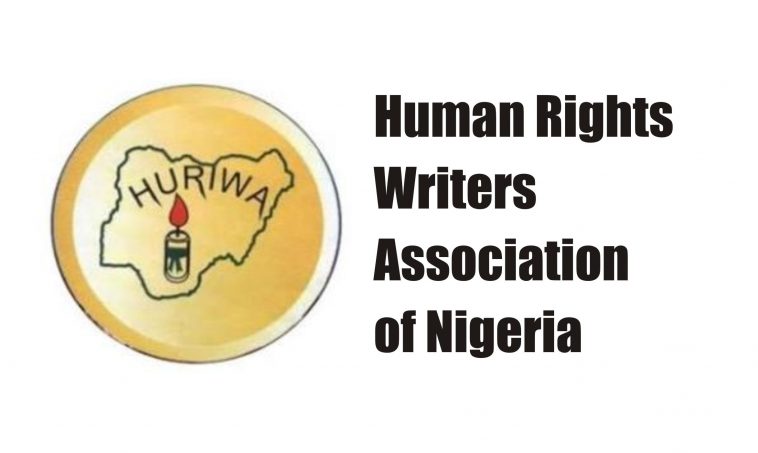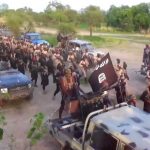Says forces working for tenure extension may be fueling terrorism…..
Prominent pro-democracy and Civil Rights Advocacy Group-: HUMAN RIGHTS WRITERS ASSOCIATION OF NIGERIA (HURIWA) has applauded President Muhammadu Buhari’s decision to categorically warn supporters of third term gambit to perish the idea as he will inevitably step down as the Constitution stipulates on May 29th 2023.
HURIWA has however tasked the President to investigate the conspiracy theory that those who may be working to torpedo the Nigerian Constitution and obtain illicit tenure extension through subterfuge may be the forces behind the rapidly expanding frontiers of coordinated terror attacks across the Country.
Specifically, the Rights group said those promoting the coordinated violence may be doing so with the mind that there would be situation of uncontrolled mass terrorism towards the 2023 election period that may occasion the eventual declaration of a national state of emergency and by so doing procure incremental tenure extension for the incumbent President since election may be postpone in the situation of general anarchy.
In a media statement by the National Coordinator Comrade Emmanuel Onwubiko and the National Media Affairs Director Miss Zainab Yusuf, HURIWA said it is imperative that President Muhammadu Buhari sets a time line for his military commanders within which time the war on terror must come to a manageable conclusion.
HURIWA said anything outside of establishing a clear time line for the end of the war on terror and the immediate declaration of armed Fulani attackers as terrorists will definitely validate the alleged conspiracy theory flying around that the current government does not wish to conduct free and fair election to elect its successor and therefore may be plotting tenure extension, may be believed as accurate going by the provisions of the constitution which creates the opportunity for election to be deferred and for the incumbent President to extend her tenure in the case of a declaration of a national emergency.
In a paper prepared by the legal desk of HURIWA titled “What the law state may happen if insecurity permeates all across Nigeria and result in the declaration in the state of emergency in Nigeria”, the Rights group said the possibility is high to believe that members of the deep state working towards achieving tenure extension for the incumbent President Muhammadu Buhari are behind the spate of terror attacks and the growing armed Fulani insurgency all over the Country and the seeming unwillingness by the Federal Government to disarm these different non state actors and also refusing declaring them as terrorists, has made it even the more believable and convincing.
HURIWA wrote as follows: “The President according to section 305 of the 1999 constitution of Nigeria as amended will declare a state of emergency.
SECTION 305 of the 1999 Constitution provides for the imposition of a state of emergency in the country or any part of it. The section empowers the president to issue the declaration by way of official gazette.
It added, however, that a two-thirds majority of the National Assembly must ratify the executive proclamation within two days, if the legislators are in session, or 10 days, if they are not.
It states: 305(1) Subject to the provisions of this Constitution, the President may by instrument published in the Official Gazette of the Government of the Federation issue a Proclamation of a state of emergency in the Federation or any part thereof.
(2) The President shall immediately after the publication, transmit copies of the Official Gazette of the Government of the Federation containing the proclamation including the details of the emergency to the President of the Senate and the Speaker of the House of Representatives, each of whom shall forthwith convene or arrange for a meeting of the House of which he is President or Speaker, as the case may be, to consider the situation and decide whether or not to pass a resolution approving the Proclamation.
(3) The President shall have power to issue a Proclamation of a state of emergency only when:
(a) the Federation is at war;
(b) the Federation is in imminent danger of invasion or involvement in a state of war;
(c) there is actual breakdown of public order and public safety in the Federation or any part thereof to such extent as to require extraordinary measures to restore peace and security;
(d) there is a clear and present danger of an actual breakdown of public order and public safety in the Federation or any part thereof requiring extraordinary measures to avert such danger;
(e) there is an occurrence or imminent danger, or the occurrence of any disaster or natural calamity, affecting the community or a section of the community in the Federation;
(f) there is any other public danger which clearly constitutes a threat to the existence of the Federation; or
(g) the President receives a request to do so in accordance with the provisions of subsection (4) of this section.
(4) The Governor of a state may, with the sanction of a resolution supported by two-thirds majority of the House of Assembly, request the President to issue a Proclamation of a state of emergency in the state when there is in existence within the state any of the situations specified in subsection (3) (c), (d) and (e) of this section and such situation does not extend beyond the boundaries of the state.
(5) The President shall not issue a Proclamation of a state of emergency in any case to which the provisions of subsection (4) of this section apply unless the governor of the state fails within a reasonable time to make a request to the President to issue such Proclamation.
(6) A Proclamation issued by the President under this section shall cease to have effect:
(a) if it is revoked by the President by instrument published in the Official Gazette of the government of the federation;
(b) if it affects the Federation or any part thereof and within two days when the National Assembly is in session, or within 10 days when the National Assembly is not in session, after its publication, there is no resolution supported by two-thirds majority of all the members of each House of the National Assembly approving the Proclamation;
(c) after a period of six months has elapsed since it has been in force:
Provided that the National Assembly may, before the expiration of the period of six months aforesaid, extend the period for the Proclamation of the state of emergency to remain in force from time to time for a further period of six months by resolution passed in like manner; or
(d) at any time after the approval referred to in paragraph (b) or the extension referred to in paragraph (c) of this subsection, when each House of the National Assembly revokes the Proclamation by a simple majority of all the members of each House.
The Fate of 2023 Election and the Implication Of Declaring State Of Emergency.
Normally, the official gazette will specify the extent and scope of the emergency powers. The following additional powers can be exercised under emergency rule:
• Massive deployment of the armed forces to take charge of security in place of the policy Invasion of people’s privacy (including homes and offices). Searches can be conducted without a warrant suspects can be arrested and detained without being charged
• Special laws can be enacted to punish those who flout the emergency rules
• Quasi-judicial: bodies can be set up to try offenders rights to lawful assembly and freedom of expression and communication can be restricted the Nigerian government can decide to take over the executive and legislative functions of the affected state destruction and confiscation of private property without compensation to the victims restrictions on the conduct of private businesses including financial transactions.
• Under emergency rule, the government enjoys wide powers which infringe on human rights and fundamental freedoms. The Siracusa Principles limit which rights can be infringed. During the enforcement of emergency rule, however, these principles might not be adhered to.
What are the dangers of declaring a state of emergency?
The government can abuse the emergency powers. In fact, dictators around the world abuse emergency rule. They impose restrictions on people’s rights and freedoms.
Inclusion, it can also lead to temporary suspension of the democratic order and pave the way for the ascendancy of anti-democratic forces. Nigeria runs a federal system – a situation where the federating units are expected to enjoy autonomy. But the country’s federal system is deeply flawed with power and resources inordinately in control of the cent just like in a leading case in PLATEAU STATE OF NIGERIA AND ANOTHER V ATTORNEY GENERAL OF THE FEDERATION AND ANOTHER (SC 113/2004)[2006] NGSC 39 (20 JANUARY 2006) (SC 113/2004) [1960] NGSC 1 (19 JANUARY 2006).”






